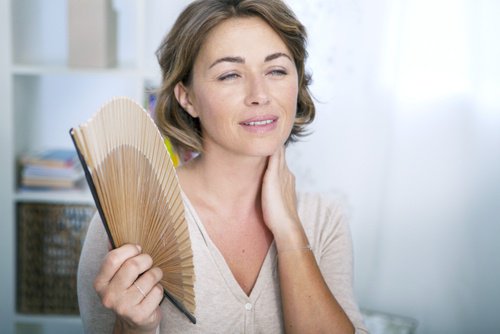Symptoms of Menopause

Between 40 and 50 years of age, women face a new period of bodily transformation: menopause, in which ovulation stops and menstruation disappears. However, there are more symptoms of menopause to be aware of. In this article, we’ll show you some others.
Like other natural body changes, the symptoms of menopause don’t show up the same way in all women. These can vary in intensity, duration and even in when they appear.
Although the disappearance of menstruation is the unmistakable sign of the beginning of this stage in women’s lives, there are also others indicators. In fact, some refer to perimenopause. That is, the preparation of the body to face these changes that occur.
What Are the Symptoms of Menopause?
We’ll provide a brief description of each of the symptoms that usually accompany this phase. Again, it’s necessary to emphasize that 15% of women, approximately, don’t feel any discomfort before menopause arrives.
Menstrual Period Irregularity
This becomes longer, shorter, more intense or delayed. It’s a clear sign that the woman’s reproductive system is “turning off.” It usually occurs for several years until it disappears completely. Specialists say that women enter fully into the stage of menopause when a year passes without having their period.
Hot Flashes
You’ll feel a very noticeable heat sensation in your body, which also extends to your face. Hot flashes generate a lot of discomfort in women, since usually your skin becomes red.
In addition, they can occur multiple times during the same day. At night, women may wake up due to a sweat for no reason and may suffer inconveniences while sleeping.
Vaginal Infection
It’s very likely that the woman feels like urinating more often. Beyond this, certain vaginal infections can also appear that must be treated and medicated by a doctor.

Changes in Mood
Like pregnancy, menopause and the years leading up to it is a phase of important hormonal changes in women’s bodies.
Therefore, sudden mood swings, even without being in the company of other people, are completely natural. Likewise, other sensations, often inexplicable, may occur.
A woman who is about to enter menopause may suddenly feel irritable, sad, nervous, or anxious for no apparent reason.
Headaches
As we noted before, not all bodies adapt in the same way to these changes. Therefore, vasomotor irregularities can occur that cause symptoms such as dizziness and headaches of varying intensities.
Changes in Sex Drive
As a product of this “hormonal revolution,” the woman can see a noticeable difference in her sexual appetite. Anyway, this doesn’t mean that you’ll never have intimate relationships again.
The goal here is to talk with your partner so that there is a mutual understanding. Although the desire remains active, vaginal dryness or lack of sensitivity may make the experience something that isn’t as enjoyable. So, it is advisable to take things slowly and know that soon everything will be as before.
“The symptoms of menopause don’t show up the same way in all women. These can vary in intensity, duration and even in when they appear.”
Ways to Take Care of Yourself during Menopause
This period is a lifelong condition from the moment it begins. Therefore, it is highly recommended that women take responsibility of having a healthy life to cope with it in the best way possible.
In that sense, certain habits become very important. Some of them are:
- Eat well: A varied and healthy diet is essential, since during menopause, you may be lacking essential vitamins and minerals. Your doctor may do some examinations to tell you exactly what your nutritional requirements are.
- Exercise: Keeping your body active is vital to maintain muscle and bone health. Precisely because of the previously mentioned nutritional failure, these complications can occur. On the other hand, a light exercise of 30 minutes a day helps prevent diabetes, cholesterol and blood pressure problems.
- Eliminate food and unhealthy habits: This includes reducing fat intake, limiting carbohydrates and, if possible, reducing coffee and tobacco intake as much as possible.
- Sunbathing: About 15 minutes a day of sunlight provides your body with the vitamin D it needs. It also helps to release tension and improve mood.
- When having sex, it’s beneficial to use lubricants or get a good excitement to make this happen naturally. In addition, exercises for the pelvic floor are also helpful.

Should I Take Medications?
Many women resort to specific medications to alleviate the symptoms of menopause. Actually, this is something very specific to each person. Logically, it must be the doctor who evaluates the situation and prescribes the appropriate medication.
In no way should the woman herself decide to take medication. As mentioned before, each body is different and so are your needs and special care.
All cited sources were thoroughly reviewed by our team to ensure their quality, reliability, currency, and validity. The bibliography of this article was considered reliable and of academic or scientific accuracy.
- Cano, A. (2009). La menopausia. Acta Ginecologica.
- Capote Bueno, M. I., Segredo Pérez, A. M., & Gómez Zayas, O. (2011). Climaterio y menopausia. Revista cubana de medicina general integral, 27(4), 543-557. http://scielo.sld.cu/scielo.php?script=sci_arttext&pid=S0864-21252011000400013
- Dennerstein L, Lehert P. (2004). Women’s sexual functioning, lifestyle, mid-age, and menopause in 12 European countries. Menopause 2004;11;778-785.
- Hernández-Valencia, M., Córdova-Pérez, N., Basurto, L., Saucedo, R., Vargas, C., Vargas, A., … & Zárate, A. (2010). Frecuencia de los síntomas del síndrome climatérico. Ginecol Obstet Mex, 78(4), 232-237. http://www.nietoeditores.com.mx/nieto/Ginecologia/2010/abril10/art.original_frecuencia.pdf
- Landa Goñi, J., Lopes Rauno, P., Hernandez Nunez, J., & Nunez Palomo, S. (2002). Menopausia. Atencion Primaria. https://doi.org/10.1016/S0212-6567(02)79072-0
- Landgren BM, Collins A, Csemiczky G, et al. (2004).Menopause transition: annual changes in serum hormonal patterns over the menstrual cycle in women during a nine-year period prior to menopause. J Clin Endocrinol Metab 2004;89:2763-2369.